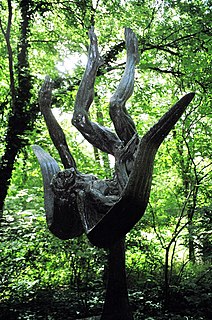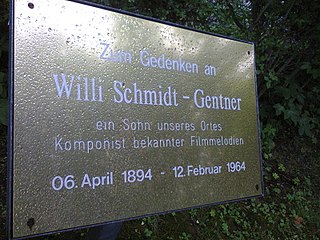Umlauf is an Austrian family name, found also in Moravia. [1]
Notable people with the surname include:
- Ignaz Umlauf (1746-1796), Austrian composer, Kapellmeister of the emperor's German-language Singspiel theatre in Vienna
- Michael Umlauf (1781–1842), an Austrian composer, conductor (notably of Beethoven's 9th Symphony), and violinist, son of Ignaz Umlauf.
- Charles Umlauf (1911–1994), an American sculptor
Ignaz Umlauf (1746-1796) was an Austrian composer. He was Kapellmeister of the new German National Singspiel of Emperor Joseph II beginning from 1778 to his death. His son Michael Umlauf (1781-1842) was also a notable composer, and his daughter Elisabeth, mother of the composer Gustav Hölzel, was an operatic contralto.
Michael Umlauf, was an Austrian composer, conductor, and violinist. His father, Ignaz Umlauf, was also a notable composer. His sister, Elisabeth Hölzel, had a career as a contralto and her son Gustav Hölzel was an important bass-baritone.

Charles Umlauf was an American sculptor and teacher who was born in South Haven, Michigan. His sculptures can be found in churches, numerous public institutions, outdoor locations, and museums, including the Houston Museum of Fine Arts, the Smithsonian Institution in Washington, D.C, and the Metropolitan Museum of Art in New York, as well as in many private collections. Umlauf received a number of accolades, including a Guggenheim Fellowship and a Ford Foundation Grant.
- Umlauf Sculpture Garden and Museum
- Klaas Heufer-Umlauf (1983) a German television host
- K.A. Umlauf, student of Engel, who gave a complete proof of Engel's theorem in his 1891 dissertation

Klaas Heufer-Umlauf is a German television host, actor and singer.
In representation theory, a branch of mathematics, Engel's theorem is one of the basic theorems in the theory of Lie algebras; it asserts that for a Lie algebra two concepts of nilpotency are identical. A useful form of the theorem says that if a Lie algebra L of matrices consists of nilpotent matrices, then they can all be simultaneously brought to a strictly upper triangular form. The theorem is named after the mathematician Friedrich Engel, who sketched a proof of it in a letter to Wilhelm Killing dated 20 July 1890. Engel's student K.A. Umlauf gave a complete proof in his 1891 dissertation, reprinted as.










